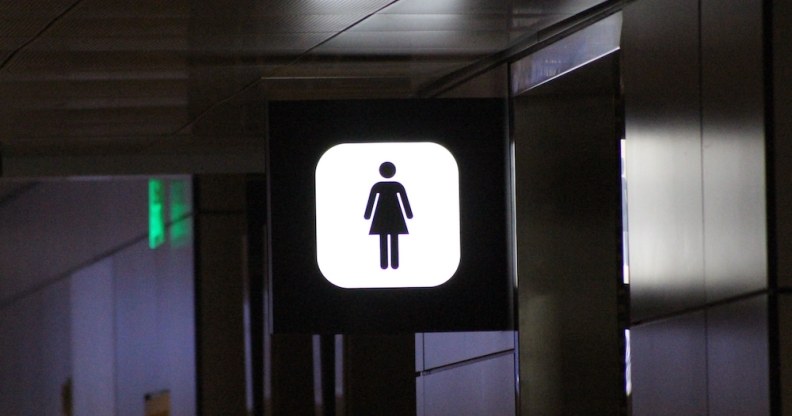Lawyers explain in simplest terms why barring trans people from single-sex spaces would be unlawful

Toilet sign (Envato)
Any attempt to exclude trans people from single-sex spaces would be in direct contravention of the Equality Act, legal experts have said.
There was widespread backlash on Thursday (10 February) when Vice World News reported on alleged unpublished guidance by the Equality and Human Rights Commission (EHRC) that would advise business and other organisations to prohibit most trans people from using single-sex spaces that match their gender, such as bathrooms.
Under the leaked draft, which the EHRC has denied any knowledge of, organisations would be advised to only let trans people who possess a Gender Recognition Certificate (GRC) access single-sex spaces. It’s estimated that just one per cent of trans people in the UK have a GRC – applicants must undergo complex medical and psychiatric evaluations and are required to “prove” their gender before they can have their gender legally recognised.
The EHRC has denied that it’s planning to bar trans people from accessing single-sex spaces without a GRC.
Lui Asquith is director of legal and policy at Mermaids, a charity that advocates for trans youth. They haven’t seen the leaked guidance, but they say that it would be “unlawful” if it’s as described by Vice.
“The reason it has been suggested as being unlawful is because the Equality Act doesn’t insist on somebody requiring a GRC, which is the legal document that changes somebody’s legal gender,” Asquith tells PinkNews. Because the Equality Act “doesn’t require somebody to have a GRC to be protected by the Equality Act”, any “insistence on somebody requiring it to access single-sex spaces… [wouldn’t] have any legal premise”.
According to Asquith, any requirement that trans people have a GRC before they can access single-sex spaces would go “over and above the framework of current equality legislation”. They also note that the “undignified” process that’s currently in place for trans people to obtain a GRC has resulted in “a very small population” of trans people actually being able to get one.
Under the Equality Act, the default position is inclusion, Asquith says – but there are situations in which “lawful discrimination” against people who fall under certain protected characteristics is permitted. “Gender reassignment” is a protected characteristic under the Equality Act, but there are “limited circumstances” where a person can be lawfully excluded.
However, in order to exclude a trans person from single-sex spaces, there must be “an objective justification” and it must be “proportionate” and “legitimate”.
Asquith continued: “The idea of blanket guidance requiring an individual to have a GRC [to access single-sex spaces] prompts the question: how is that proportionate and how does that provide for a legitimate approach?
“It’s very difficult to be persuaded that that approach could be lawful if it’s as described by Vice… If [the guidance] were to be published I imagine it would be challenged very quickly, and it would be hard to see how that could stand up in law given the current framework of the Equality Act.”
Jolyon Maugham, a barrister and director of the Good Law Project, echoes that sentiment. He says he has “no doubt” that any such guidance would be struck down in the courts.
“If you look at the Equality Act it describes the protection for transgender people in terms that are not synonymous with the Gender Recognition Certificate (GRC),” Maugham tells PinkNews. “In other words, the protection extends to those living in a gender other than that assigned at birth. So it’s just wrong to describe the protection as only extending to those who have a GRC.
“If the EHRC were to issue guidance that said only trans people with a GRC can benefit from that legal protection, that guidance would be challenged and the guidance would fall. There is no doubt about it. Good Law Project would back or bring a challenge, and the law is clear.”
Limiting trans people’s freedoms would have a detrimental impact on mental health
While Asquith and Maugham agree that such guidance wouldn’t stand up under the law, they are both deeply concerned about the impact any attempt to exclude trans people would have on the community.
Asquith says trans people’s access to single-sex spaces has already been impacted by the toxic discourse about trans lives that’s been going on in the UK in recent years, “just through a manifestation of their anxiety”.
“An increased risk of being challenged when you go to the toilet – that’s already happening…. I can speak from personal experience how my anxiety has increased over the past few years around using single-sex facilities as a result of this toxic ‘debate’.”
Of the Vice report, Asquith said: “When you try and invite a non-trans person to think about the impact of this, imagine essentially being asked to carry around papers in your back pocket to use the toilet. I mean, that is quite extraordinary and just shrieks inhumanity, having to provide papers to use and access a very basic human need.”
Asquith is also keen to point out that any change to single-sex provisions wouldn’t just impact on the trans community – it could also have repercussions for cis people who don’t fit neatly into stereotypical ideas about gender, and would be “a dangerous move for absolutely everybody in general society”.
LGBT+ rights groups no longer have faith in the EHRC
Like many others, Maugham believes the EHRC is no longer fit for purpose.
“[The EHRC] is no longer a human rights institution. We think it is now a tool, it’s a political branch of government. So the label no longer reflects the contents.”
The independence of the EHRC, which is sponsored by the Government Equalities Office, has been questioned by LGBT+ rights groups and advocates for some time. The body has come under fire repeatedly in recent weeks for its approach to trans issues.
In January, the EHRC was widely condemned by LGBT+ groups when it said a ban on trans conversion therapy should be delayed so more research could be conducted. The body had previously urged Scotland to hit pause on plans to reform its gender recognition laws.
Since then, Vice World News has published several exposés detailing how staff have quit en masse because of an allegedly “transphobic” culture at the EHRC and how the body held “private meetings” with anti-trans groups.
This isn’t just about it being unlawful, this is about a potential action that is deeply, deeply disturbing and traumatic.
The commissioners of the EHRC are appointed by Liz Truss, minister for women and equalities. Baroness Kishwer Falkner was appointed chair in 2020, after which the watchdog held private meetings with anti-trans groups such as LGB Alliance and Fair Play For Women.
The way the EHRC has courted anti-trans sentiment has been “shocking” to Asquith.
“It’s incredibly sad, and I think that’s an important word as well. This isn’t just about it being unlawful, this is about a potential action that is deeply, deeply disturbing and traumatic. Let’s put aside the technicalities for a second – let’s just talk about basic human dignity. That’s what we’re dealing with here. We’re dealing with a scenario that would create nothing but indignity for trans individuals and it’s just deeply upsetting.”
A spokesperson for the EHRC denied that it’s planning to stop trans people from accessing single-sex spaces without a Gender Recognition Certificate.
“We aim to publish guidance on single-sex spaces in due course, in line with our mandate to advise on equality and human rights laws, and in response to longstanding calls from a range of stakeholders and service providers,” a spokesperson said.
“Any guidance we produce will explain how to comply with the legal provisions approved by Parliament in the Equality Act.
“Much of this report is seriously inaccurate and does not match any document we are aware of. It is completely false to suggest that we are looking to bar trans people from accessing spaces without a Gender Recognition Certificate. The Equality Act provisions on gender reassignment are not predicated on possession, or not, of a Gender Recognition Certificate.”


